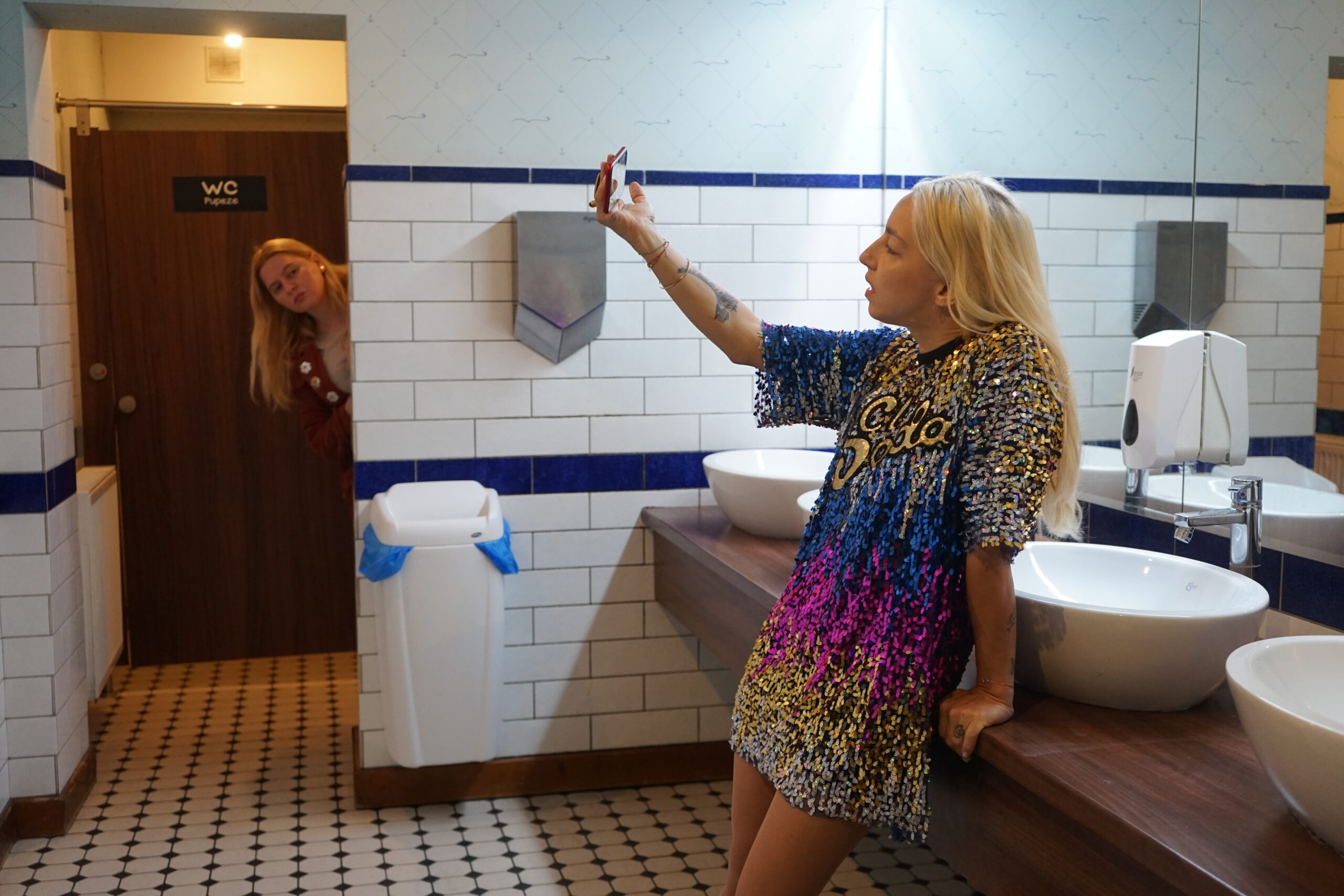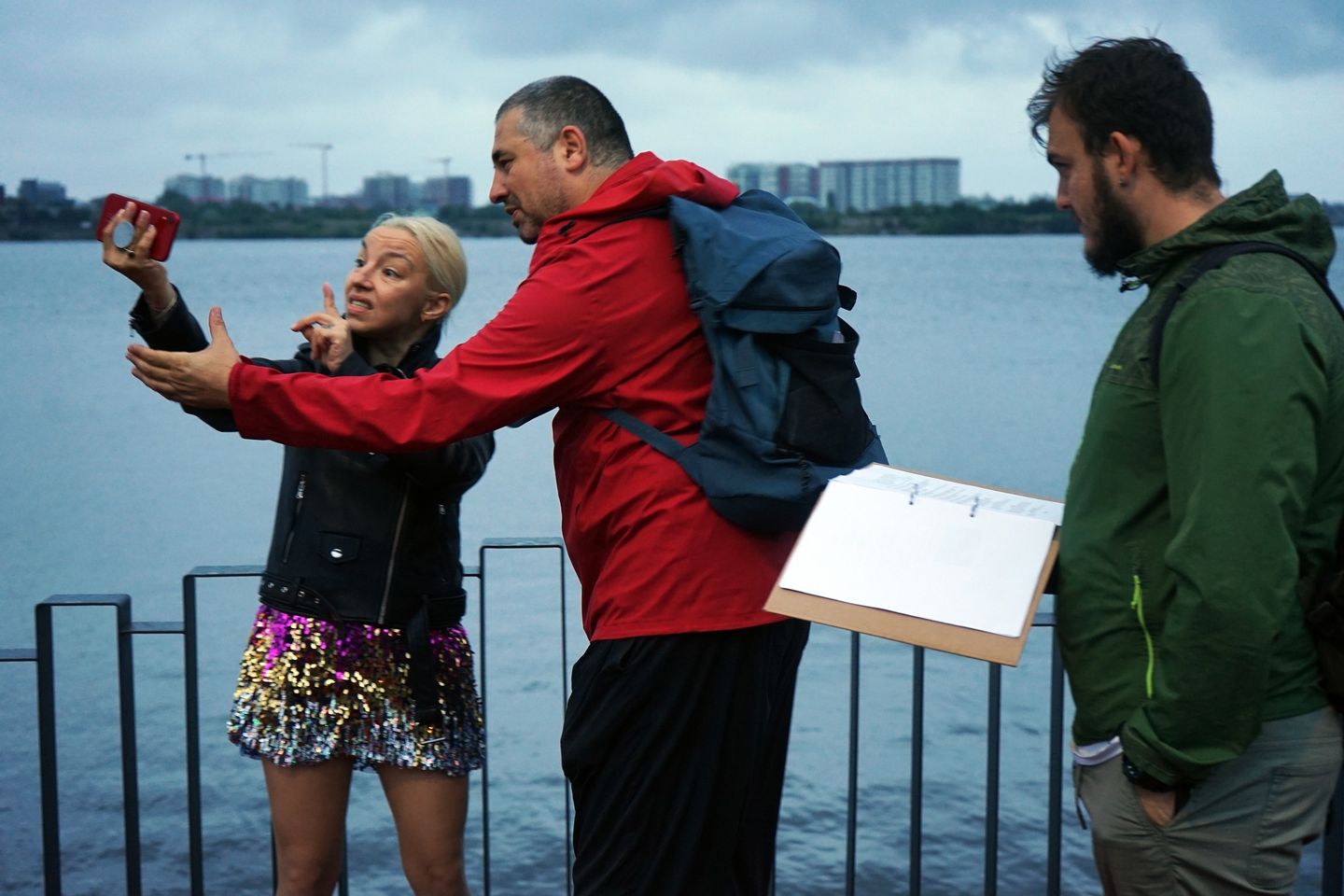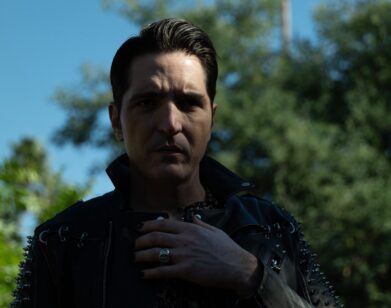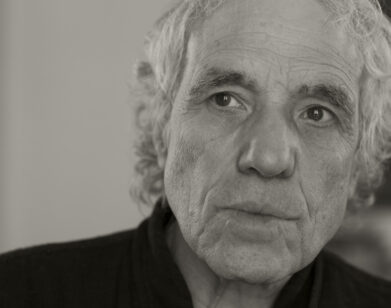DIRECTOR
How Radu Jude Made the Defining Movie of the TikTok Era
The works of the Romanian filmmaker Radu Jude are provocations that make us investigate the impetus of art and life. Though Jude isn’t sure his movies could be categorized as “essay films,” he has been labeled “Godardian” for crafting politically charged films in which he stirs scripted scenes with actors and other forms of media (newsreels, past movies, etc.) to expose the evils of society. His latest satire, Do Not Expect Too Much from the End of the World, released in theaters last week, follows PA Angela (a breakthrough Ilinca Manolache) filming testimonials of injured workers sharing how they got their disabilities from on-set accidents for her employer.
To achieve social media fame, Angela shoots TikToks in what little time off she’s afforded after long drives—accompanied by snippets of the 1981 film Angela Moves On—as the Andrew Tate-filtered Bobiță, a toxically masculine caricature. Do Not Expect is a hilarious study of cinema’s purpose that understands the crude and exploitative ways we often interact with art. Earlier this month, over Zoom, I spoke to Jude about industry awards, artificial intelligence, and audience interactions.
———
EDWARD FRUMKIN: Awards season just ended. I can’t stop thinking about you flipping the bird with your Locarno Special Jury Prize. What are your thoughts on awards, and the idea of giving prizes to something immeasurable like cinema?
RADU JUDE: I used to be completely against the system of awards, and I still am in a certain way. I think, first of all, I’m against it because it’s a bit ridiculous now. It somehow turns all adults into children. You’re in school again and the teachers are giving you an award. But on the other hand, I can understand that if it wasn’t this system, it would have to be another one, whether it’s the reviews, the film, the critics, the box office or whatever. There will always be a system of measuring the things which are of course not measurable by design or by themselves, one against another. I’m like that football coach who lets his team be happy for one day in case of a victory and be sad also for only one day in case of defeat. I am happy for one day if I’m receiving an award and if I don’t, I don’t have a problem. Sometimes it’s good and they are helpful, and sometimes they are toxic. I think we all know a lot of people who are as destroyed by success as they are by failure. I don’t want to belong to any of these categories.
FRUMKIN: To speak about your film, Do Not Expect Too Much from the End of the World, the two sources driving the structure are the fictional storyline based on the real life PA who died while falling asleep, and the 80s movie Angela Moves On. Which of the two came first?
JUDE: It was the incidents. The real life stories are the basis of the film. And at some point, I had Bell’s Palsy, a facial nerve paralysis. You can see that my blinking is still not in sync somehow. I had that a few years ago, and there’s a case from the second part of the film with that guy who in real life also had severe half-paralysis. These cases are somehow exemplary, or THEY symbolize, in my opinion, not only work experiences that I had or some personal stories but more than that, I hope. Then, the desire was to find a form for these stories and readapt them to contemporary life, so to speak. My projects are always built in layers. I add another layer and then another layer, so sometimes they become like patchwork. The Angela Moves On film from the 1980s came later on.
FRUMKIN: Just from watching the film itself, it feels like it’s the other way around, because instead of just including clips from Angela Moves On, you also have Dorina Lazar and László Miske playing fictional continuations of their characters.
JUDE: Well, yes, I see what you mean. And you’re right. But this is because when I had the idea to add Angela Moves On, I reworked the whole project. So yeah, in a way, you can say that it was a feedback mechanism. What came late in the process started the whole project from the beginning in a way. So yeah, that’s true.
FRUMKIN: What inspired you to cast Dorina and László?
JUDE: I cast them because they were part of the old film. So when I had the idea to make this whole film, I had the idea to mix them with the new because the film somehow always goes between documentary and fiction. And this was also a way to expand, to treat the people from the fiction in 1981 as documentary characters in a way so that you can take and put them in another fiction. But the whole film has this back and forth between what is considered documentary, or reality, and fiction, the fictional, the imaginary.
FRUMKIN: I know others have described a few of your other films as essay films. You said, “I don’t know what an essay film is.” Do you embrace the label now?
JUDE: Look, yes, very much. But only if we give it a broader definition than what’s usually accepted nowadays. Because if you read these Timothy Corrigan books on essay films, I think he gives a very limited set of rules for what the film essay is. For instance, a film essay, he says, has to have a commentary in the first person. So from this point of view, because my film doesn’t have this commentary, it is not an essay film. But in a broad way, it’s an attempt to explore a theme from different angles. And because of the mix of documentary elements with fictional elements, I would like to consider it an essay film, but I don’t know if that’s accepted.
FRUMKIN: Let’s let other critics decide what it is. As we see in the film, social media and A.I. have been helpful and detrimental to people’s thinking. How do you see these technological features formulating people’s minds?
JUDE: Well, I think I can understand these dangers, which are real. There’s a lot of problems with social media. They spy on us and toxic ideologies can be shared very rapidly. But that’s true for everything. We should find a way to take what’s good and throw out what’s bad, if that’s possible. . Because, at the same time that TikTok is taking your data and whatever, it’s really a kind of vernacular cinema. It’s really striking sometimes and really, really powerful and really, really creative and inspiring in many ways. Not everything, and not always, of course. But I started to like it at some point. From an anthropological point of view, it’s interesting more than it is beautiful, but sometimes it’s beautiful as well.
FRUMKIN: Angela’s TikToks feel like the primary source of comedy in the film. And I know that she says it’s a caricature of Bobiță. Did you see her TikToks as a form of rebellion against her bosses so that she can say whatever she wants during her day job?
JUDE: Oh, yes. Maybe also it’s a way to relieve the tension, a way to make money in the future. There’s a lot of people who are doing these kinds of things, dreaming that at some point they will become influencers of some kind and they will be paid or they will host advertisements or whatever. It’s very difficult for me to give one reason and say, “Oh, the character is doing this because of that.” I think there’s a spectrum of possibilities.
FRUMKIN: At your virtual New York Film Festival appearance, you invited people to email you their responses. Have you got any responses from these emails?
JUDE: Yes. Actually, a lot.
FRUMKIN: What was the reception like?
JUDE: Well, some were angry and one of them was really angry for including TikTok videos in the film because he considered TikTok such a low form of expression. Others were just insulting and some were very, very kind and positive.
FRUMKIN: How do you see the role of audience engagement with you as a filmmaker?
JUDE: Well, of course, I consider that the film is made for an audience, like Godard used to say when he was asked, “Who do you make the film for?” And he said, “For the audience.” And the interviewer said, “Which audience?” And Godard said, “The right audience.” What can I add? I don’t know.
FRUMKIN: Well, Jean-Marie Straub once said, “We make our films with Danièle Huillet so that audiences can walk out of them.” Do you enjoy seeing walkouts or different types of visceral reactions?
JUDE: Well, yes and no. I mean, of course I want the film to be appreciated, but at the same time I try not to put so much emphasis on that because I know that when you believe in one side of the coin, then you have to believe in the other one as well. So if I believe so much in the appreciation, then I have to believe as much when the film is dismissed and suffer, and I don’t want to suffer. Sometimes I think that rejection, even strong rejection, is the first step to acceptance. Because when you reject something and you walk out, you have a kind of strong reaction. And I think the brain keeps returning to that. And after a few years, you might discover, as has happened to me many times, that I now love something that I hated 10 years ago. So whenever someone is walking out of my films, it might be the first step for a beautiful friendship.
FRUMKIN: Lastly, when you do any form of media production, features or short or docs, how do you take care of your mental health in this laborious field?
JUDE: I used to work a lot doing TV and commercials, et cetera. When I gave up those, I felt so free all of a sudden to concentrate only on films. That gives me a lot of energy and good vibes, so I can go on. I like it. I like the work. I like to work.








